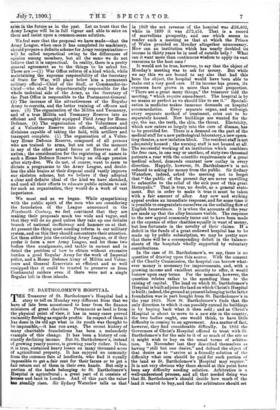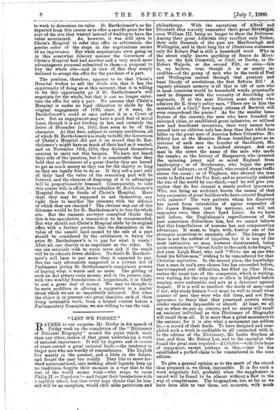ST. BARTHOLOMEW'S HOSPITAL. T HE Treasurer of St. Bartholomew's Hospital had
a story to tell on Monday very different from that we have of late been accustomed to hear from the finance ministers of great charities. Permanent as land is from the physical point of view, it has in many cases proved eminently fleeting as regards profits. In respect of them it has done in its old age what in its youth was thought to be impossible,—it has run away. The recent history of many charitable foundations has been a melancholy example of this change. It has been a history of con- stantly declining income. But St. Bartholomew's, instead of growing yearly poorer, is growing yearly richer. It has, it is true, sustained heavy losses on many thousand acres of agricultural property. It has enjoyed no immunity from the common fate of landlords, who find it equally impossible to get a fair rent for their farina or to get a fair return out of them in their own hands. But only a portion of the lands belonging to St. Bartholomew's Hospital is agricultural ; a great part of it consists of louses and land in London. And of this part the value has .steadily risen. Sir Sydney Waterlow tells us that in 1869 the net revenue of the hospital was £38,462, while in 1899 it was £72,454. That is a record of marvellous prosperity, and one which seems to render such a meeting as that at which the Prince of Wales presided on Monday altogether unnecessary. How can an institution which has nearly doubled its income in thirty years be in need of outside help ? What can it want more than continuous wisdom to apply its vast resources to the best uses ?
It would not be true, however, to say that the object of Monday's meeting was to ask for money. But while we say this we are bound to say also that had this been the object, the hospital would have been able to "make out a very good case. If its income has grown, its expenses have grown in more than equal proportion. " There are a great many things," the treasurer told the meeting, " which require amendment. The hospital is by no means so perfect as we should like to see it." Speciali- sation in medicine makes immense demands on hospital accommodation. Every separate organ, and well-nigh every separate method of treatment, cries out to be separately housed. New buildings are wanted for the eye, the ear, the teeth, the skin, the throat. Electricity, which now enters so largely into the cure of disease, has to be provided for. There is a demand on the part of the medical staff for a new pathological laboratory, a new opera- ting theatre, a new isolation block. The resident staff is not adequately housed ; the nursing staff is not housed at all. The successful working of an institution which combines the free care, in one way or another, of sixty-two thousand patients a year with the scientific requirements of a great medical school, demands constant new outlay in every direction. Happily, however, St. Bartholomew's is not reduced to asking for money from the public. Sir Sydney Waterlow, indeed, asked the meeting not to forget that " the public of the present day are never unwilling to subscribe to the relief of the sick poor of this great Metropolis." That is true, no doubt, as a general state- ment. But in order to make it true it must be taken with a fair amount of alloy. Any new and striking appeal evokes an immediate response, and for some time it is possible to congratulate ourselves on the unfailing flow of English benevolence. It is when the accounts of the year are made up that the alloy becomes visible. The response to the new appeal commonly turns out to have been made at the expense of other charities equally in want of money, but less fortunate in the novelty of their claims. If a deficit in the funds of a great endowed hospital has to be made up by public subscription, we may be pretty sure that there will be a corresponding deficit in the balance- sheets of the hospitals wholly supported by voluntary contributions.
In the case of St. Bartholomew's, we say, there is no question of drawing upon this source. With the consent of the Charity Commission, the hospital can borrow what- ever money is necessary for improvements, and, with a. growing income and excellent security to offer, it would borrow upon easy terms. For the moment, however, the question relates rather to the spending than to the raising of capital. The land on which St. Bartholomew's Hospital is built adjoins the land on which Christ's Hospital is built; indeed, the ground at present belonging to the latter foundation was in part bought from St. Bartholomew's in the year 1819. Now St. Bartholomew's finds that the only direction in which it can possibly extend its buildings is by buying back what it then sold ; and as Christ's Hospital is about to move to a new site in the country, the two bodies ought, one would think, to have little difficulty in coming to an agreement. As a matter of fact, however, they find considerable difficulty. In 1893 the Governors of Christ's Hospital offered to treat with St. Bartholomew's for the sale to it of so much of the site as it might wish to buy on the usual terms of arbitra- tion. In November last they described themselves as having " still but one desire," and defined the object of that desire as to "arrive at a friendly solution of the difficulty what sum should be paid for such portion of the land as St. Bartholomew's Hospital may require." It is not very obvious why there should at this point have been any difficulty needing solution. Arbitration is a well-understood process, and all that needed doing was that St. Bartholomew's should decide how much of the land it wanted to buy, and that the arbitrators should set to work to deterilaine its value. St. Bartholomew's so far departed from this course as to offer a specific price for the part of the site they wanted instead of waiting to have the value ascertained. As, however, it was still open to Christ's Hospital to refer this offer to arbitration, the precise order of the steps in the negotiations seems of no importance. • But while negotiations were going on in this somewhat dilatory manner the Governors of Christ's Hospital had had another and a very much more advantageous proposal submitted to them—a proposal to buy the whole site—and in view of this they simply declined to accept the offer for the purchase of a part. - The position, therefore, appears to be that Christ's Hospital wishes to sell the whole site, that it has the opportunity of doing so at this moment, that it is willing to let this opportunity go if St. Bartholomew's will negotiate for the whole, but that it can no longer enter- tain the offer for only a part. We assume that Christ's Hospital is under no legal obligation to abide by the original engagement of 1893, since, if it were, St. Bartholomew's could at once enforce it in a Court of Law. But an engagement may have a good deal of moral force, though it is not binding in law, and certainly the letter. of December 1st, 1893, does seem to be of this character. At that date, subject to certain conditions, all of which St. Bartholomew's is ready to fulfil, the Governors of Christ's Hospital ,did put it on record that St. Bar- tholomew's might have as much of their land as it wanted, and on November 16th, 1899, they declared themselves anxious to carry out this bargain. We have not heard their side of the question, but it is conceivable that they hold that as Governors of a great charity they are bound to get as much money as they can for the charity so long as they are legally free to do so. If they sell a part only of their land the value of the remaining part will be lowered, and the chances of disposing of it to advantage will be proportionately lessened. Consequently, to take this course will, in effect, be to subsidise St. Bartholomew's Hospital from may funds of Christ's Hospital. Have they, they may be supposed to ask, themselves, any right thus to sacrifice the interests with the defence of which they are charged ? The obvious way out of this dilemma would be for St. Bartholomew's to buy the whole site. But the eminent surveyor consulted thinks that this is too speculative a transaction to be recommended.
• • But why should not Christ's Hospital abide by its original offer, with a further proviso that the diminution in the value of the unsold land caused by the sale of a part should be considered by the arbitrators in fixing the price St.. Bartholomew's is to pay for what it wants ? After all, one chariti is as important as the other. No one can seriously wish to nurse more sick if the result will be to educate fewer children. No doubt St. Bartholo- mew's will have to pay more than it expected to pay. But the only alternative suggested is a private Act of Parliament giving St. Bartholomew's compulsory powers of buying what it wants and no more. The getting of such an Act always costs money, and in the present case, with two wealthy foundations at loggerheads, it is likely to cost a great deal of money. We may be thought to be mere meddlers in offering a suggestion in a matter about which we are so imperfectly informed. But when the object is to prevent two great charities, each of them doing invaluable work, from a heated contest before a Perliamentary Committee, we are willing to run the risk.











































 Previous page
Previous page